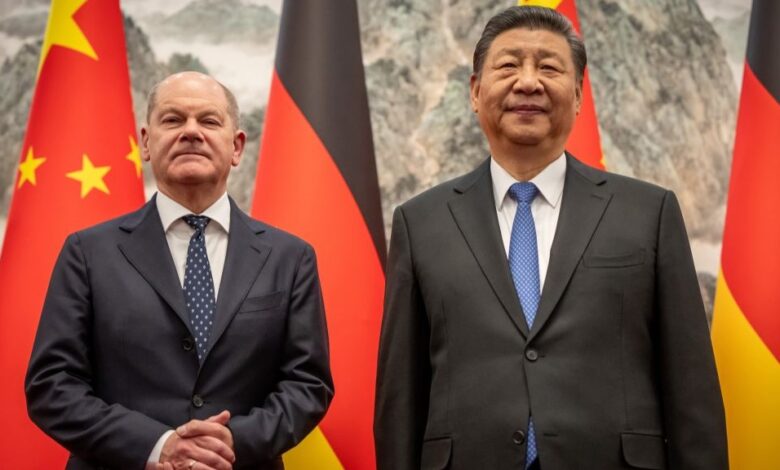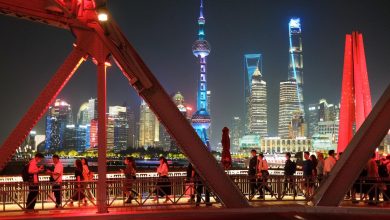Xi says China exports relieved global inflation in Scholz talks

CHINESE leader Xi Jinping told his German counterpart that a surge in Chinese clean-technology exports have helped the world tackle inflation, as he pushed back against European and US pressure to rein in the country’s powerhouse industries.
“China’s export of electric vehicles, lithium batteries and solar products have enriched supplies to the global market and eased inflationary pressure, as well as made a great contribution for global efforts to tackle climate change and green transition,” Xi told Chancellor Olaf Scholz, according to Chinese state television.
In an apparent response to Western criticism of excess capacity in Chinese industry – which have led to threats of new trade barriers – Xi said China and Germany should look at the question “objectively” and address it from a market perspective. He also warned against protectionism.
The visit comes as tensions between China and the European Union and US mount over trade, as well as the war in Ukraine. The EU has kicked off probes into Chinese subsidies for electric vehicles and support for windparks, and will soon launch an inquiry into the procurement of medical devices.
Before Tuesday’s (Apr 16) meeting in Beijing, Scholz said he’d raise trade rules as well as Russia’s war in Ukraine and climate issues.
“We are committed to strengthening the rules-based system for global trade and developing it further together with the other” World Trade Organization members, the German leader said. Scholz also said he’d talk to the Chinese leader about “how we can contribute more to a just peace in Ukraine.” He added that Germany and China needed to work together to find solutions to halt climate change and master the green energy transition in a socially just way.
GET BT IN YOUR INBOX DAILY

Start and end each day with the latest news stories and analyses delivered straight to your inbox.
Xi touted the importance of China-Germany ties as the world faces “increasingly more challenges and risks.” He added that the two nations should “join hands to inject more certainties” internationally.
Scholz’s trip also coincides with fears about a wider war in the Middle East, as top Israeli military officials reasserted that their country has no choice but to respond to Iran’s weekend drone and missile attack.
Scholz is on the final leg of his four-day trip to his nation’s main trading partner. He earlier warned Chinese officials to address overcapacity and treat foreign firms better. He was also set to meet Chinese Premier Li Qiang later on Tuesday.
US Treasury Secretary Janet Yellen said on a visit to China earlier this month that the vast output of China’s factories had become a global problem. The US won’t take “anything off the table,” including the possibility of additional tariffs, to stem the flood of Chinese goods, she told CNN over the weekend.
Beijing has dismissed charges that the rapid growth of its EV industry was due to government subsidies as “groundless,” instead pointing to its innovation prowess.
While Scholz has been careful to stay on good terms with his hosts during his second visit as chancellor, he has been more assertive about his nation’s worries than his predecessor, Angela Merkel, who prioritised business interests.
Scholz told an audience of university students on Monday in Shanghai that “competition must be fair.” He added that he would like to see “no dumping” and “no overproduction,” and that copyrights should be respected.
The criticisms aimed at China come as Xi leans on his nation’s massive manufacturing industry to reinvigorate economic growth that has faced headwinds from an unfolding property crisis, deflationary pressures and lacklustre consumer demand.
China reported data on Tuesday that showed economic growth beat expectations in the first quarter as the industrial sector powered forward, although a tail-off in March activity signalled more support may be needed to sustain that momentum.
Europe has been unhappy with China since the start of the fighting in Ukraine in early 2022. Beijing has provided Moscow with diplomatic and political support, and trade between the nations hit a record US$240 billion last year, cushioning the blow from Western economic sanctions.
On Monday, Scholz told reporters in Shanghai that he would urge China to stop supplying so-called “dual use” products to Russia that can be used for military and civilian purposes. He called on all nations “not to circumvent the sanctions imposed by the international community,” and to refrain from providing the Kremlin with weapons, including dual-use goods.
China has said it has not and will not seek to benefit from the war. BLOOMBERG





